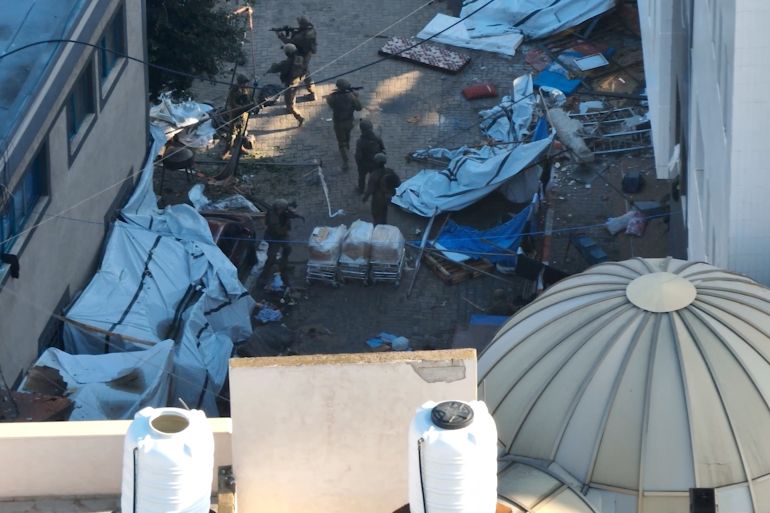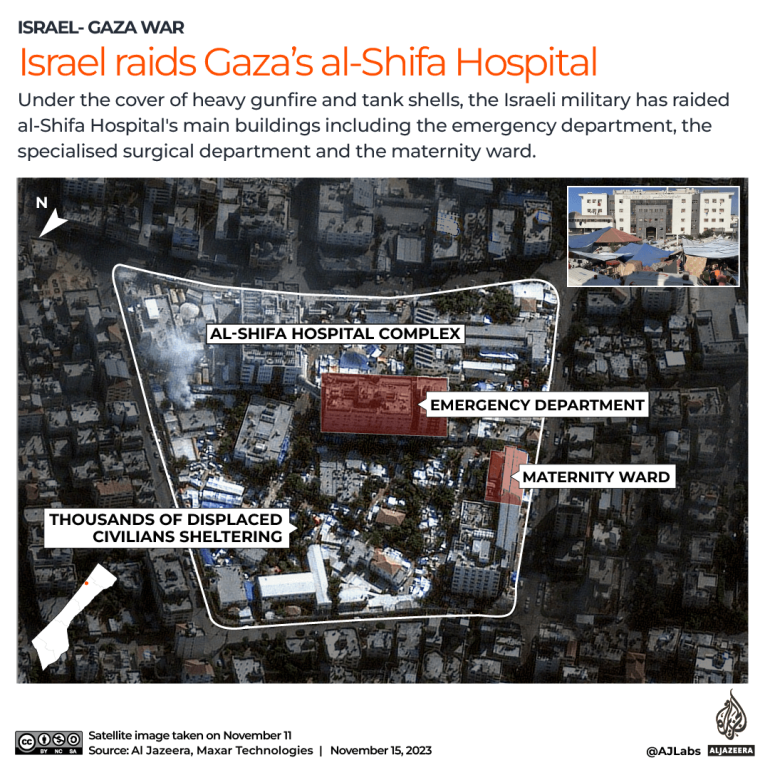Criticism of Israel’s attack on Gaza’s largest hospital is adding to global disquiet over its war on the enclave.

Published On 15 Nov 202315 Nov 2023
World leaders and international aid organisations have strongly criticised Israel’s assault on al-Shifa Hospital, the largest medical facility in the Gaza Strip.
After a week of incursions across Gaza in what some are calling a “war on hospitals”, governments, United Nations agencies and other aid organisations expressed their distress on Wednesday as Israel’s military raided al-Shifa, in which thousands of patients, staff and displaced people are trapped.
Voices were raised against Israel’s decision to directly target a facility that should be a safe haven under the rules of war.
“Hospitals are not battlegrounds,” the UN’s undersecretary-general for humanitarian affairs and emergency relief coordinator, Martin Griffiths, stated on X.
“The protection of newborns, patients, medical staff and all civilians must override all other concerns,” he said.
Tedros Adhanom Ghebreyesus, head of the World Health Organization, agreed that the attacks are “deeply concerning”.
“We’ve lost touch again with health personnel at the hospital,” Tedros said on X, adding: “We’re extremely worried for their and their patients’ safety.”
The International Committee of the Red Cross said in a statement that it was “extremely concerned about the impact on sick and wounded people, medical staff, and civilians”.
“All measures to avoid any consequences on them must be taken,” it said.
Mounting criticism
The Palestinian Authority on Wednesday denounced Israel’s operation inside Gaza’s largest hospital. The attack is a “flagrant violation of international law”, said a statement from the Palestinian Ministry of Foreign Affairs, which demanded “urgent international intervention to protect the civilians there”.
Mahmoud Abbas, president of the Palestinian Authority, issued some of his strongest words yet.
“We are facing together a barbaric war of aggression and an open war of genocide against our people in the Gaza Strip and in the West Bank,” he said in a speech in Ramallah marking the 35th anniversary of the Palestinian Declaration of Independence.
The Gaza Strip government’s media office called for intervention to stop the “holocaust”.
World leaders have added their voices to the condemnation and reiterated pleas for action to protect civilians.
Turkish President Recep Tayyip Erdogan stated: “If Israel continues its massacres, it will be seen everywhere in the world as a ‘universally condemned terrorist state’.”
Jordan accused the UN Security Council on Wednesday of enabling the “barbarism” of Israel’s raid on Gaza’s main hospital through its silence.
Foreign Minister Ayman Safadi wrote on X that the council “is providing cover for war crimes. It is unacceptable, unjustifiable. The Council must act.”
The condemnation adds to mounting criticism around the globe of Israel’s bombardment of Gaza and its refusal to agree to a humanitarian ceasefire as casualties grow. More than 11,000 people are now reported to have been killed in the enclave. About 1,200 people were killed in Hamas’s October 7 attacks.
Canadian Prime Minister Justin Trudeau added to this sentiment, warning Israel: “The world is watching. The world is witnessing this killing of women, of children, of babies. This has to stop.”
Belize joined other Latin American countries in suspending diplomatic ties with Israel and recalling its ambassador due to its “indiscriminate bombing”.

Inside al-Shifa
Although the UN estimated about 2,300 people are inside al-Shifa Hospital, Al Jazeera’s Tareq Abu Azzoum reported on Wednesday that about 7,500 Palestinians, including patients, doctors and displaced people, were sheltering there.
Even before the raid, the situation inside the hospital was “horrific”, with medical procedures taking place without anaesthetic, families with scant food or water living in corridors and the stench of decomposing bodies filling the air, he reported.
Dr Ahmed El Mohallalati, a surgeon, spoke by phone from the hospital saying that staff hid as fighting unfolded and tanks entered the hospital complex. “One of the big tanks entered within the hospital from the eastern main gate, and they were, they were, they just parked in the front of the hospital emergency department.”
“All kinds of weapons were used around the hospital. They targeted the hospital directly. We try to avoid being near the windows,” he said.
The hospital’s director, Muhammad Abu Salmiya described being unable to communicate with doctors throughout the hospital to inquire about the condition of patients, and said that he was unaware of the state of the premature babies being treated there.
Abu Salmiya told Al Jazeera that no one from the Israeli army had contacted him since the hospital was stormed, and that water, electricity and oxygen were completely cut off inside.
“The patients’ wounds began to rot significantly after all services in the hospital stopped,” he said. “The smell of death wafts everywhere.”
